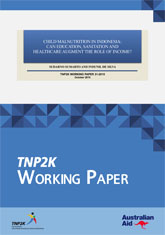Child Malnutrition in Indonesia: Can Education, Sanitation and Healthcare Augment the Role of Income?
TNP2K Working Paper 31
October 2015
Authors: Sudarno Sumarto and Indunil De Silva
In spite of sustained economic growth and progress in poverty reduction, the status of child nutrition in Indonesia is abysmal, with chronic malnutrition rates continuing to remain at very high levels. In this backdrop, this study attempts to shed light on the channels through which various socioeconomic risk factors affect children’s nutritional status in Indonesia. We investigated the impact of child, parental, household characteristics, access and utilization of healthcare, and income effects on children’s heightfor-age and on the probability of early childhood stunting. Using recent data from IFLS surveys and Indonesia’s National Health Survey, and controlling for an exhaustive set of socioeconomic factors, the study revealed that maternal education, water and sanitation conditions, household poverty and access to healthcare strongly influence chronic malnutrition in Indonesian children. Child stunting rates were surprisingly high even in the wealthiest quintile of households, implying that income growth will not automatically solve the nutritional problem.
Our findings bear important policy implications and represent a further step towards an improved understanding of the complex determinants of child malnutrition. As a policy recommendation, we suggest the implementation of direct supply-side policies aimed at child malnutrition. In particular, two kinds of strategies are noteworthy. First to maximize impact, nutrition-specific interventions targeting the poorest and high burden regions in Indonesia may include, for example, breastfeeding promotion, vitamin and mineral supplements, improved sanitation facilities, public healthcare services and insurance coverage. Second, adopting nutrition-sensitive development planning across all sectors in the country will help ensure that development agendas fully utilize their potential to contribute to reductions in child malnutrition in Indonesia.
The TNP2K Working Paper Series disseminates the findings of work in progress to encourage discussion and exchange of ideas on poverty, social protection and development issues.
Support for this publication has been provided by the Australian Government through the Poverty Reduction Support Facility (PRSF). The findings, interpretations and conclusions herein are those of the author(s) and do not necessarily reflect the views of the Government of Indonesia or the Government of Australia.
You are free to copy, distribute and transmit this work, for non-commercial purposes.
Suggested citation: Sumarto,S., and I. De Silva. 2015. ‘Child Malnutrition in Indonesia: Can Education, Sanitation and Healthcare Augment the Role of Income?’. TNP2K Working Paper 31-2015. Jakarta, Indonesia: Tim Nasional Percepatan Penanggulangan Kemiskinan (TNP2K).
To request copies of the report or for more information on the report, please contact the TNP2K - Knowledge Management Unit (kmu@tnp2k.go.id).
